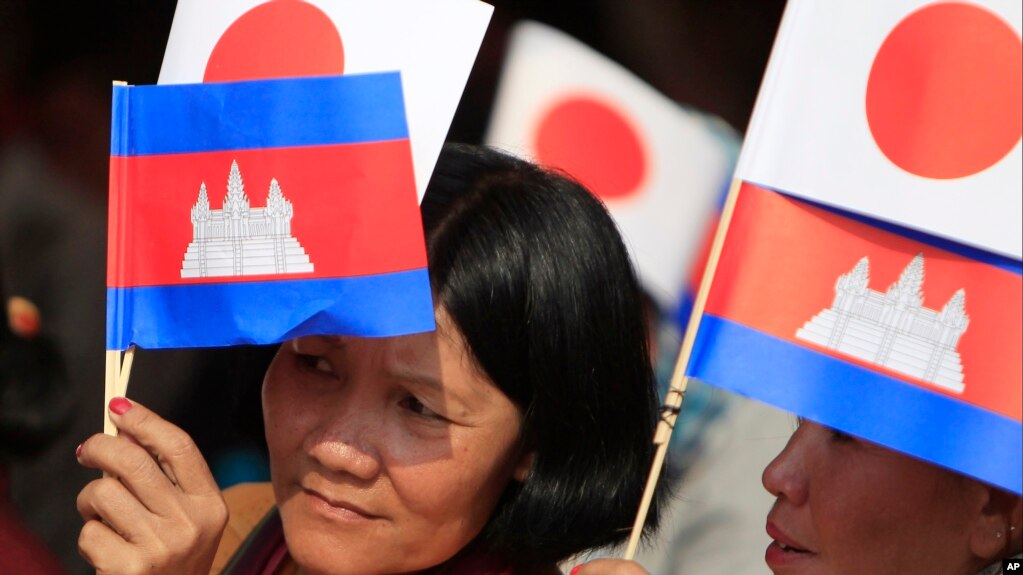05 August 2018
Sun Narin
voa

Cambodians hold Japan's flags and their national flags as they listen to Prime Minister Hun Sen's speech during an inauguration ceremony of a road funded by Japan for its official use at Kdey Takoy village, outside of Phnom Penh, Cambodia, Tuesday, March 13, 2018. (AP Photo/Heng Sinith)
“I told Mr. Prak Sokhonn that the results were disappointing in many ways as many of the ballots were judged invalid, although Japan had given its support to ensure that the polls would reflect the will of the voters,” Japanese Foreign Minister Taro Kono said, according to the NHK report.”
-Japanese Foreign Minister Taro Kono
PHNOM PENH —
A week after Cambodia’s general election, which the ruling Cambodian People’s Party (CPP) won in a landslide victory after it banned its main opposition, Japanese Foreign Minister Taro Kono called the poll “disappointing.”
Japan, which provides funding and technical support for Cambodia’s National Election Committee (NEC), had remained silent in the aftermath of the election. Japan sent election monitors to Cambodian elections in 1993, 1998, 2003 and 2008, but did not do so this year.
Japanese television station NHK reported that Japanese Foreign Minister Taro Kono expressed concerns about how Cambodia’s election was conducted in a meeting with his counterpart, Prak Sokhonn, in Singapore on Saturday.
“I told Mr. Prak Sokhonn that the results were disappointing in many ways as many of the ballots were judged invalid, although Japan had given its support to ensure that the polls would reflect the will of the voters,” Kono said, according to the NHK report.
He also urged the Cambodian government to further democratize its political process by creating an environment for holding dialogues with opposition parties, according to NHK.
Prak Sokhonn responded that his country had carried out a democratic election, according to the report.
Phay Siphan, a Cambodian government spokesman, defended the election as an event that strengthened democracy, benefitted Cambodia and was conducted according to Cambodian values.
“This is the choice for Cambodian democracy, not for any foreigners to decide,” he told VOA Khmer.
Siphan accused the Japanese foreign minister of criticizing the election only for the sake of “geopolitics.”
“[T]hey want to grab Cambodia for geopolitics and want Cambodia to become those countries’ puppet,” he said.
Ahead of the election, Cambodians who live in Japan, the US and EU countries had protested the conduct of the government in the lead-up to the poll, urging those governments not to recognize the election.
Threats and intimidation of people who supported the opposition or did not want to vote were widely reported, including the threat of withholding state services if people did not vote, despite the fact that it is legal to boycott an election.
The CPP-dominated National Election Committee reported voter turnout at 82 percent, but a large number of voters spoiled their ballots.
Most Western democracies condemned the election, questioning the legitimacy of the results due to the absence of the opposition Cambodia National Rescue Party, which was banned in November.
The US said on Monday that the election was “neither free nor fair and failed to represent the will of the Cambodian people.” The US repeated calls for the Cambodian government “to take tangible actions to promote national reconciliation by allowing independent media and civil society organizations to fulfill their vital roles unhindered, immediately releasing Kem Sokha and other political prisoners, and ending the ban on the political opposition.”
The EU said the election “lacked genuine electoral competition and the absence of an inclusive political process mean that the 29 July election is not representative of the democratic will of the Cambodian electorate and therefore its outcome lacks credibility.”
Separately, Australia said it had “serious concerns” over how the election had been conducted and was “disappointed that Cambodian people have been unable to choose their representatives.”
However, China has endorsed the election results.
Geng Shuang, China’s foreign ministry spokesman, told reporters early this week that the parliamentary election was “Cambodia's internal affairs and a major event in the political life of Cambodians.”

No comments:
Post a Comment